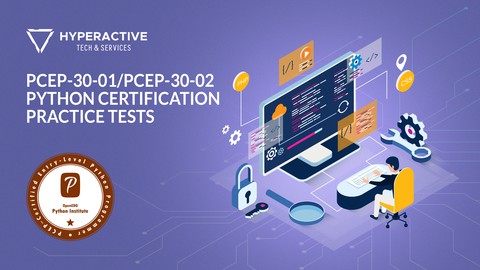
PCEP-30-01/PCEP-30-02 Python Certification Practice Tests
PCEP-30-01/PCEP-30-02 Python Certification Practice Tests, available at $54.99, has an average rating of 3, 6 quizzes, based on 2 reviews, and has 18 subscribers.
You will learn about Get entry level knowledge of Python language Learn practically how to set up a first program Prepare to PCEP certification exam Python basics as an entry to Data Science This course is ideal for individuals who are Everybody who wants to test their knowledge of Python. It is particularly useful for Everybody who wants to test their knowledge of Python.
Enroll now: PCEP-30-01/PCEP-30-02 Python Certification Practice Tests
Summary
Title: PCEP-30-01/PCEP-30-02 Python Certification Practice Tests
Price: $54.99
Average Rating: 3
Number of Quizzes: 6
Number of Published Quizzes: 6
Number of Curriculum Items: 6
Number of Published Curriculum Objects: 6
Number of Practice Tests: 6
Number of Published Practice Tests: 6
Original Price: $22.99
Quality Status: approved
Status: Live
What You Will Learn
- Get entry level knowledge of Python language
- Learn practically how to set up a first program
- Prepare to PCEP certification exam
- Python basics as an entry to Data Science
Who Should Attend
- Everybody who wants to test their knowledge of Python.
Target Audiences
- Everybody who wants to test their knowledge of Python.
PCEP-30-01/PCEP-30-02: Certified Entry-Level Python Programmer
There are six Practice Tests with preparation questions from all knowledge areas
to prepare for the PCEP-30-01/PCEP-30-02 exams at the Python Institute.
Every question has an explanation and a Try-It-Yourself-Code
which you can run to better understand the topic.
You can download the Try-It-Yourself-Code for all questions.
(The download link will be in your welcome message.)
Exam Syllabus
Computer Programming and Python Fundamentals
-
Understand fundamental terms and definitions
interpreting and the interpreter, compilation and the compiler, lexis, syntax and semantics -
Understand Python’s logic and structure
keywords, instructions, indenting, comments -
Introduce literals and variables into code and use different numeral systems
Boolean, integers, floating-point numbers, scientific notation, strings, binary, octal, decimal, and hexadecimal numeral system, variables, naming conventions, implementing PEP-8 recommendations -
Choose operators and data types adequate to the problem
numeric operators: ** * / % // + –, string operators: * +, assignments and shortcut operators, operators: unary and binary, priorities and binding, bitwise operators: ~ & ^ | << >>, Boolean operators: not and or, Boolean expressions, relational operators ( == != > >= < <= ), the accuracy of floating-point numbers, type casting -
Perform Input/Output console operations
print(), input() functions, sep= and end= keyword parameters, int() and float() functions
Conditional Blocks and Loops
-
Make decisions and branch the flow with the if instruction
conditional statements: if, if-else, if-elif, if-elif-else, multiple conditional statements, nesting conditional statements -
Perform different types of iterations
the pass instruction, building loops with while, for, range(), and in; iterating through sequences, expanding loops with while-else and for-else, nesting loops and conditional statements, controlling loop execution with break and continue
Data Collections – Tuples, Dictionaries, Lists, and Strings
-
Collect and process data using lists
constructing vectors, indexing and slicing, the len() function, basic list methods (append(), insert(), index()) and functions (len(), sorted(), etc.), the del instruction; iterating through lists with the for loop, initializing loops; in and not in operators, list comprehensions; copying and cloning, lists in lists: matrices and cubes -
Collect and process data using tuples
tuples: indexing, slicing, building, immutability; tuples vs. lists: similarities and differences, lists inside tuples and tuples inside lists -
Collect and process data using dictionaries
dictionaries: building, indexing, adding and removing keys; iterating through dictionaries and their keys and values, checking the existence of keys; keys(), items() and values() methods -
Operate with strings
constructing strings, indexing, slicing, immutability; escaping using the character; quotes and apostrophes inside strings, multi-line strings, basic string functions and methods
Functions and Exceptions
-
Decompose the code using functions
defining and invoking user-defined functions and generators; the return keyword, returning results, the None keyword, recursion -
Organize interaction between the function and its environment
parameters vs. arguments; positional, keyword and mixed argument passing; default parameter values, name scopes, name hiding (shadowing), the global keyword -
Python Built-In Exceptions Hierarchy
BaseException, Exception, SystemExit, KeyboardInterrupt, abstractive exceptions, ArithmeticError, LookupError along with IndexError and KeyError; TypeError and ValueError exceptions, the AssertError exception along with the assert keyword -
Basics of Python Exception Handling
try-except, try-except Exception, ordering the except branches, propagating exceptions through function boundaries; delegating responsibility for handling exceptions
Course Curriculum
Instructors
-
Hemant Sharma
Professional Trainer, Instructor, AWS and Python Certified
Rating Distribution
- 1 stars: 1 votes
- 2 stars: 0 votes
- 3 stars: 0 votes
- 4 stars: 0 votes
- 5 stars: 1 votes
Frequently Asked Questions
How long do I have access to the course materials?
You can view and review the lecture materials indefinitely, like an on-demand channel.
Can I take my courses with me wherever I go?
Definitely! If you have an internet connection, courses on Udemy are available on any device at any time. If you don’t have an internet connection, some instructors also let their students download course lectures. That’s up to the instructor though, so make sure you get on their good side!
You may also like
- Top 10 Content Creation Courses to Learn in December 2024
- Top 10 Game Development Courses to Learn in December 2024
- Top 10 Software Testing Courses to Learn in December 2024
- Top 10 Big Data Courses to Learn in December 2024
- Top 10 Internet Of Things Courses to Learn in December 2024
- Top 10 Quantum Computing Courses to Learn in December 2024
- Top 10 Cloud Computing Courses to Learn in December 2024
- Top 10 3d Modeling Courses to Learn in December 2024
- Top 10 Mobile App Development Courses to Learn in December 2024
- Top 10 Graphic Design Courses to Learn in December 2024
- Top 10 Videography Courses to Learn in December 2024
- Top 10 Photography Courses to Learn in December 2024
- Top 10 Language Learning Courses to Learn in December 2024
- Top 10 Product Management Courses to Learn in December 2024
- Top 10 Investing Courses to Learn in December 2024
- Top 10 Personal Finance Courses to Learn in December 2024
- Top 10 Health And Wellness Courses to Learn in December 2024
- Top 10 Chatgpt And Ai Tools Courses to Learn in December 2024
- Top 10 Virtual Reality Courses to Learn in December 2024
- Top 10 Augmented Reality Courses to Learn in December 2024






















